Christ
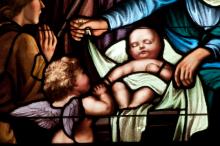
Brace yourselves. The calendar has turned over to December, which means that the inevitable discussion on the “War on Christmas” will soon see it’s opening salvo for 2013.
It is inevitable. There will be an outrage by a prominent figure about how we have lost our moral fabric because as someone was buying gifts with money they don’t have to impress people that they don’t always like, the cashier will commit the unthinkable sin of wishing us a “Happy Holidays” instead of “Merry Christmas.”
There will be gnashing of teeth as a town or city somewhere will have a “Holiday Parade” rather than a “Christmas Parade,” as Tulsa had done several years ago. (The parade was subsequently boycotted by one of it’s senators.)
The chorus of those who would profess to be Christians will shout that the “Political Correctness Police” have overstepped yet another boundary and that we should not take the “Christ out of Christmas” as the batch of perceived slights against Christendom freshly reveal themselves for this holiday season.
As a person who would say that Jesus is the most important thing in my life, who has devoted my life to the service of God’s Kingdom, and spends all of my waking moments trying be faithful to that devotion, I have to ask: “What exactly do we mean by putting the ‘Christ back in Christmas'?”

How’s this for an unlikely scenario? One of the characters in Keith Huff’s new crime comedy, Big Lake Big City, is a petty criminal named Stewart who ends up not quite dead after a screwdriver accidently gets embedded in his skull. If the doctors try to remove it, he will die; if they leave it in, he will die. But somehow he isn’t dead yet. For a few days he walks around in a liminal space between life and death, more like a walking corpse than anything else. The sign of his violent demise is there for all to see but he manages to hide it under a Shriner’s cap. A pretty funny sight gag because you have to ignore that fact that the hat is kinda floating off kilter slighter off his head in order not to know something is terribly wrong.
Big Lake Big City is having its world premiere at Lookingglass Theater in Chicago this summer. After seeing the show and interviewing the lead actor Phil Smith for Voices of Peace Talk Radio here at Raven, I couldn’t help but see parallels to another unlikely scenario: a crucified man is resurrected with the marks of his violent death on his body for all to see. I’m pretty sure that Keith Huff did not intend to write a Christian allegory, but the themes of life, death, and resurrection reverberate through the play. Oddly enough, I think Stewart’s story can function as a parable of sorts for understanding the radical shift in the human relationship to death and violence that was made possible by the resurrection. Stay with me, now!

As Christians around the world gathered for Good Friday and Resurrection Sunday celebrations last weekend, I have reflected a great deal about the connection between the suffering and passion of Christ and the plight of the undocumented in our nation.
This past year, an amazing surge of activity and concern has emerged among believers in general, and evangelicals in particular focused on passing a new immigration policy in our country. This development is quite a surprise and change. In fact, 10 years ago it was almost impossible to find a recognized evangelical leader who was knowledgeable about immigration, let alone one who was willing to speak out on this issue.
At the core of why evangelicals have made such a dramatic change of heart is the reading of Scripture. While it is impossible to ignore that there are 92 references in Scripture where the word, 'ger' is used, speaking about the stranger in our land and our treatment of these individuals, it is not one single verse but the entire revelation of Scripture that points us towards our responsibility to love the most vulnerable people in our society.

I didn’t expect to leave a Friday night screening of Lincoln thinking about Jesus.
And I definitely didn’t expect the link to be an Italian political philosopher named Grigorio Agamben.
But of Lincoln’s many triumphs as an Oscar-season contender, its lasting effect is its surprisingly mature meditation on wisdom, freedom, and the necessity of employing the former when granted the latter.
Watching Lincoln reason aloud his justification for the Emancipation Proclamation, an act he admits to his advisors was dubiously legal at best, we encounter the film’s driving question: in a time of crisis when the rules no longer apply, what kind of moral vision do we want in leadership?

One of the great debates around Christmastime for Christians is whether to encourage or allow the belief in Santa Claus. I have friends and family on both sides of this debate, so I want to be careful here. I have a great deal of respect for the desire to keep the focus on Jesus and his birth at this time of year. I want to encourage that focus, too.
And, yet, I allow my children … I encourage them even … to believe in Santa.
We — my husband and I — don’t just stop there. We also have elves that visit our house every year during this season. Some would say that at best I am distracting from the message of Christ. At worst I am lying to my children.
The line between fantasy and falsehood is delightfully fuzzy during childhood. God created it to be this way and it is so important for a child to be able to play in this grey area.

Are you put out that a community nativity display was nixed by a city council? Did a checkout clerk greet you with "Happy Holidays" instead of "Merry Christmas"? Maybe Christmas music annoys you when the Advent fast hasn't even arrived?
Not me. I am not compelled to "reclaim" or "rescue" Christmas from the many who ignore and the few who despise its magnificent origins.
How can I be anxious or offended? I am in too much awe of its startling truth: that a baby is God, gasping for air, clasping for mother's milk, flailing his small limbs in a feed trough; taking on my frailty, contingency, vulnerability, that I might partake in his everlasting nature.
The baby is now Lord of all things visible and invisible, forever "one of us," still bearing his now glorified, nail-scarred flesh at the Father's side, making all things new for all persons, hallowing the far-flung cosmos — matter's maker now made matter, redeeming every atom and every stoney heart. This reality overpowers me with its brilliant mystery.
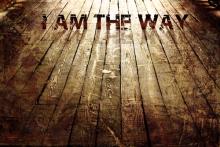
“The prevailing view in much of contemporary Christianity is more subjective. It tends to be far more focused on the happiness and moral performance of the Christian than the object of faith, Christ Himself.” –Tullian Tchvidjian
Personally I tend to always focus more on my problems when I am going through trials. I am sure that some of you reading can relate to this. It seems normal to focus on ourselves during seasons of suffering. When I look back at the most difficult time of my life, I realize how self-absorbed I was with everything that I was going through. I felt that no one could understand or relate. I felt alone and isolated. My focus was on trying to figure out a way that I could fix myself.
The days and weeks passed by and eventually my suffering faded away with time. But when I look back and remember those days it amazes me how internally focused I was! The reality that strikes me still today is the fact that there was nothing within myself that could make my suffering go away. I read my Bible and read some self-help books, but nothing could alleviate my pain. Was I doing something wrong? Did I not have enough faith? Was God punishing me for my sins? It angered me that I did not have the power within myself to just “make life all better”. I was helpless and hopeless during that season of life. There was nothing that I could do. I was a sinner in need of a Savior (1 Timothy 1:15).

In a world that seems completely and irrevocably divorced from the teachings of Christ, where in contemporary society is there a place for the Christian voice? Politicians shamelessly use Jesus’s name to justify their authority and gain influence without bothering to unpack the full depth of theological and ethical implications of their words. Corporations are granted the rights of individuals, but some individuals are denied the resources they need in times of crisis to support their families and livelihoods. And the public debate is so full of vitriol and hyperbole that dehumanization and outright hatred of those with whom we disagree has become the norm. In light of the situation in which we find ourselves, how then should Christians behave?
While it might seem appealing to remove ourselves from secular society altogether and forsake the world in all its brokenness in favor of a uniquely Christian ethic that appeals and applies only to us, Christians have an obligation to serve as active participants in public discourse— elevating the conversation rather than abstaining from it so that we may try to live the truth and convictions of our faith.

A dear friend recently reminded me of David Ford’s gem of a book, The Shape of Living: Spiritual Directions for Everyday Life. On the back cover, Nicholas Wolterstorff describes it beautifully: “[This book's] spirituality is profound and reflective, yet always concrete, and never dishonest or evasive; it uses not only Scripture but literature with creative facility. Simple, yet rich. A jewel of the spiritual life in its everyday manifestations. I want to savor it with repeated readings.”
Ford traces the “multiple overwhelmings” in our lives — the forces that shake us and shape us, those with the power to wound or crush and those that are life-giving and transformative. At stake in reckoning with such tumult is the whole of our lives and our living. “How,” he asks, ”in the midst of all our overwhelmings, are our lives shaped?”
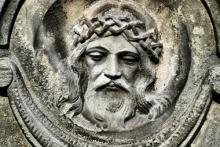
There was a movement back in the 1960s that many of us only have read about, while others vividly remember. Philosophers and theologians explored what was labeled the “Death of God” movement. Interest in the subject has re-emerged particularly as of late because William Hamilton, one of the more prominent voices in the Death of God movement, diedlast week at age 87.
The movement inspired TIME Magazine’s now-famous cover (seen here) in 1966, raising the question in the public forum: Is God Dead? The cover has since been listed by the Los Angeles Times as one of the “Ten Covers that Shook the World.”
Hamilton’s faith was shaken during his teenage years when three of his friends were making a homemade pipe bomb. The project went wrong and detonated, killing two of the three boys.
The two killed were Christians. The lone survivor, an atheist.
Hamilton’s crisis of faith centered around a theological concept known as theodicy, which explores the question: why do bad things happen to good people? More specifically, why does misfortune seem to befall the faithful, while those lacking faith enjoy what seems to be a providential hall pass?
Today is Black Friday, the unofficial holiday immediately following Thanksgiving. Today, businesses open very early, offering reduced prices on all manner of consumer items. Customers are encouraged to flood the aisles in search of a good deal on all kinds of things - from DVDs to appliances - but, above all, electronics.
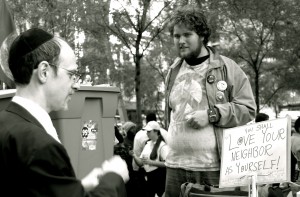 We're in this thing together or we're not in this thing at all.
We're in this thing together or we're not in this thing at all.
We should all be marching in the streets.
We are the 100 percent.
We are poor. We are well-to-do. We are those somewhere in the middle. We are aware of the struggles and unfairness of this world and for this reason we are sensitive to one another's needs. So, we love our neighbors as ourselves.
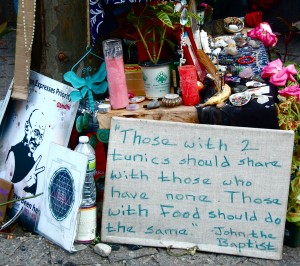 One of the constant threads in scripture is, "Give us this day our daily bread." Nothing more, nothing less. Underneath this admonition is the assumption that the more we store up for tomorrow the less people will have for today. And in a world where 1 percent of the world owns half the world's stuff, we are beginning to realize that there is enough for everyone's need, but there is not enough for everyone's greed. Lots of folks are beginning to say, "Maybe God has a different dream for the world than the Wall Street dream."
One of the constant threads in scripture is, "Give us this day our daily bread." Nothing more, nothing less. Underneath this admonition is the assumption that the more we store up for tomorrow the less people will have for today. And in a world where 1 percent of the world owns half the world's stuff, we are beginning to realize that there is enough for everyone's need, but there is not enough for everyone's greed. Lots of folks are beginning to say, "Maybe God has a different dream for the world than the Wall Street dream."
Maybe God's dream is for us to live simply so that others may simply live. Maybe God's dream is for the bankers to empty their banks and barns so folks have enough food for today.

When I applied for a job at CNN in the 90s, and told the interviewer that I had interned with an evangelical magazine called Christianity Today, his response was, "If it's Christian, it isn't journalism."
Over the years that expanded to, "If it's evangelical, it's Republican. Or Jerry Falwell. Pat Robertson. The Tea Party. Wrapped in a Patriotic Flag. White People. Derivative, cheesy music. Big Money. Big Hair." Fill in the rest of the blanks.
Are those labels a distortion of what it means to be an evangelical? Of course they are. Yet they are how evangelicals are perceived, rightly or wrongly (I personally think it's a mixture of both), in our society.
The Rev. Fred Shuttlesworth, a pioneer and giant of the civil rights movement, died Wednesday at 89.
(+Video may contain coarse language+)
Indie music darling, Jeff Mangum, who rarely plays in public, surprised #OccupyWallStreet protesters in New York City earlier this week with an impromptu concert. A New Jersey singer-songwriter pens two songs for revolutions. And an order of Catholic nuns offer free mp3 downloads of a protest song inspired by the life of St. Francis of Assisi.
Visit msnbc.com for breaking news, world news, and news about the economy
Where is the compassion in our economy and our politics? It says much of the economic system that Sojourners even needs to campaign for a "moral budget." How do we, as Christians, challenge structures that allow billions of dollars to be wasted via tax loopholes while 1 in 6 Americans live in poverty?
Will we, as Sachs hopes,
Let’s face it — while lawmakers are picking their own battles in Washington, they aren’t fighting on the ground in Afghanistan. Winning elections has become more important than implementing winning foreign policy strategies that would end the war and bring our service men and women safely home.
And it’s my generation that’s being sacrificed.
A truck bomb has killed at least 70 people in the Somali capital of Mogadishu, including a crowd of young students applying for scholarships to study abroad.

